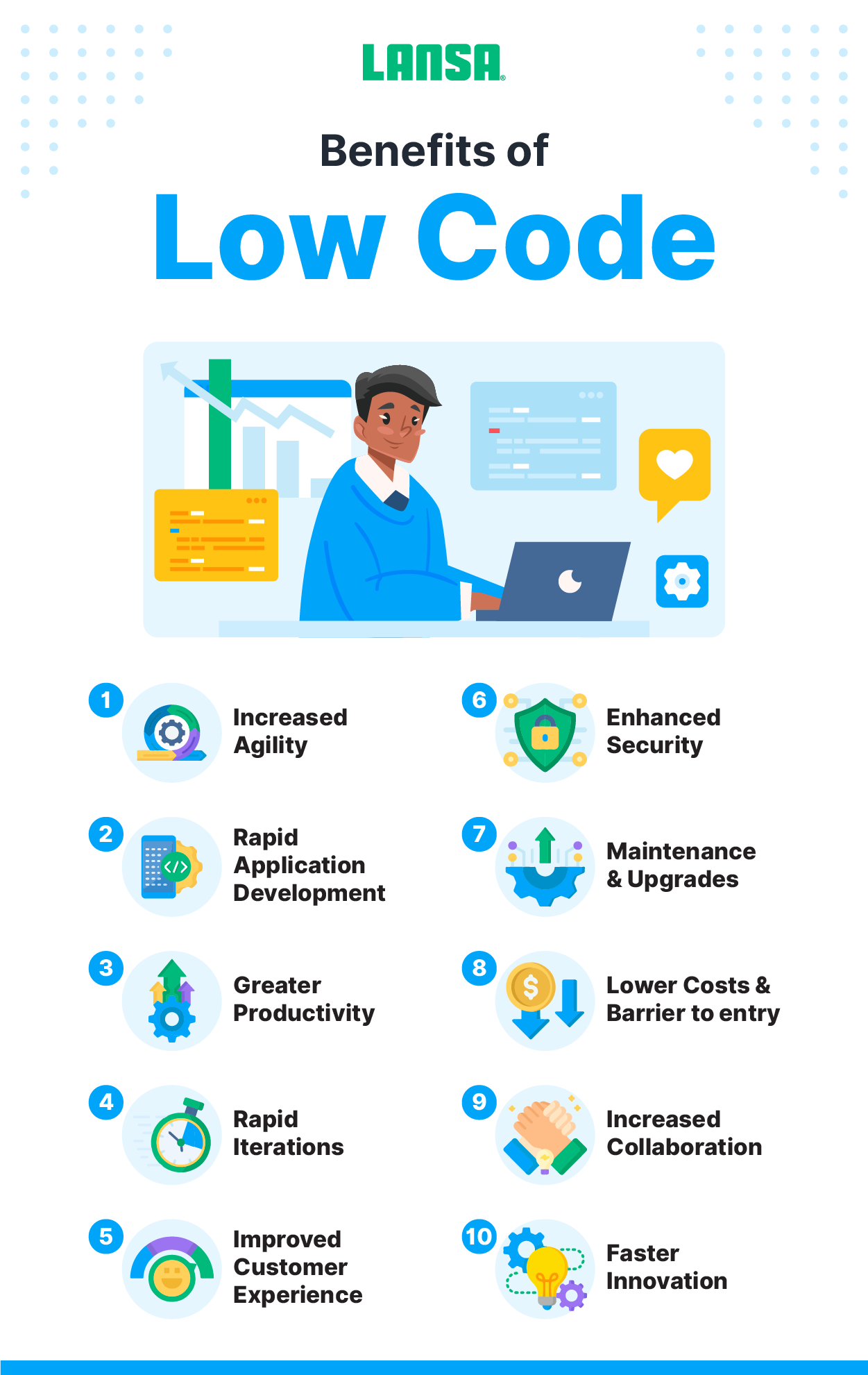Sweeping global digital transformation has put increasing pressure on organizations to modernize their business operations and meet the technical demands of consumers and clients. One of the trending solutions to meet these needs is low code development. This industry is seeing remarkable growth, valued at over $10 billion in 2020 and projected to grow to almost ten times that amount in the next five years [1]. This article will discuss what low code development is and highlight 12 benefits of a low code development platform.
What is Low-Code Development, and Why Is It Important?
Low-code development is app building with minimal manual coding. Traditional software development requires countless hours of handwritten complex code and syntax. This means that app development previously demanded skilled coders and lengthy periods of time between concept design and delivery. In the context of the traditional low-code meaning, one of the benefits of low-code platforms is they enable app development via tools that greatly reduce the amount of code that has to be written. The tools are visual and do not require extensive knowledge of coding. Some platforms are even described as low code/no-code platforms, meaning that unless the developers see the need to customize the building blocks, it is possible to produce an app with no manual coding at all.
Considering the above low code platform meaning, the benefits of low code options incorporated in app development are underlined by the realities facing organizations in a digital landscape.
- Talent scarcity. With the high demand for talent high, it can be difficult for organizations to acquire the talent needed for traditional app development.
- Time pressures. Consumer and client demands, as well as industry competitiveness, require organizations to speed up development.
- Financial pressures. The cost of app development can affect an organization’s bottom line, especially small-to-medium-sized businesses (SMBs).
Low code development is the answer to these constraints for many modern companies.
Key Benefits of Low Code
Whether your business is small and your IT team is limited, or you are running a large business with a fully staffed development team and IT management department, the benefits of low code solutions can positively affect productivity and your company’s bottom line. These are the reasons why many professionals in various industries are choosing low code development options:
1. Increased Agility
With low-code development, your business can pivot quickly, incorporating new solutions in response to changes in the market. Since teams can develop and present a working prototype more quickly, they can collect feedback and make adjustments with greater agility. The ability to respond to feedback as you receive it also saves time because you’re able to reduce the number of iterations you build.
Moreover, with the increased agility you get from low code development, you can transition from an idea to fully functioning quickly and in response to evolving needs. This way, when there is a problem you need an app to solve, you don’t have to wait several weeks or months for a solution. Because they don’t have to code from scratch, your IT teams can get more done in less time.
2. Rapid Application Development
These solutions drastically reduce the time between app concept and delivery because of easy-to-use visual tools and drag-and-drop design features, making speedy development one of the primary benefits of low code. Direct integrations with third-party vendors allow developers to use APIs, command lines, and web services as reusable building blocks.
3. Greater Productivity
Productivity is increased in two principal ways by low code solutions. First, applications are developed, tested, and deployed more rapidly, allowing IT staff to move on to their next project quickly. Another reason why this is one of the top benefits of low-code is since these platforms do not require extensive coding experience, more experienced team members can focus on projects that require expertise Low-code platforms can streamline many application development processes, accelerate development and reduce technical debt.
4. Rapid Iterations
Another benefit of low-code is more rapid iterations, which translate into ease of maintenance. With low-code platforms, development teams can quickly release new versions, repeal failed changes, and add new features and functionalities. Fewer bugs will need to be addressed because the building blocks of low code platforms are pre-tested.
5. Improved Customer Experience
The visual nature of the building blocks of low-code development allows your team to ensure the product UI meets specifications during the development process. This is another one of the primary benefits of low code because the absence of bugs means consumers will have a better experience. And even if bugs are detected or changes are implemented, the editing and update process can be accomplished so quickly that customer experience will likely not be impacted. Additionally, low code solutions allow your business to be flexible and quickly adapt to customer demands.
6. Enhanced Security With Low-Code
Often, the vulnerabilities in traditionally coded software may only be discovered after a breach. With ever-increasing cyber threats, security in app development is a major concern. Another benefit of low-code solutions is they enhance an organization’s security stance in several ways:
- Many low-code development platforms have built-in regulatory checklists
- AI-generated building blocks incorporate robust guardrails without sacrificing privacy or security
- Enterprise low-code platforms generally enforce such security best practices as authorization, data privacy, and governance, allowing centralized control over who has permission to modify privacy and security settings.
7. Maintenance & Upgrades Made Simple
One of the top benefits of low-code is whenever developers have to adjust the maintenance or upgrading process, the process is far more simple.
Because they have access to reusable modules and components, your development teams aren’t forced to start their projects from scratch. They also don’t have to manually code hundreds of lines of programming. The same applies to when they have to upgrade legacy systems. This makes it easier to provide end users with better experiences, all while using fewer resources.
Additionally, legacy application modernization results in improved user experience and security posture. With fewer bugs and integration issues, developers can spend less time on maintenance and more time on business-critical projects.
Learn more about how to modernize fast and within budget.
8. Automation
Within the development process, low-code platforms can offer access to tools for automating tasks and end-to-end processes according to preset IT parameters, which is another one of the benefits of low-code. Also, design teams can use direct integrations and access to APIs and web services to automate many different digital processes.
9. Increased Collaboration Between Business and IT
Low-code platforms promote increased collaboration by creating collaborative workspaces. These features do not require extensive technical expertise, so even non-IT business team members can share ideas and guide the development process. Improved collaboration is a key benefit of low code because it streamlines decision-making and enables you to resolve problems more quickly. Also, everyone on the team can feel a sense of ownership and increased accountability for the end product.
10. Faster Innovation
Low-code development enables junior developers and even those who are just tech enthusiasts to deliver effective apps as quickly as traditional full-stack developers. This makes speed a key benefit of low-code, especially for teams that have to code several iterations over a short period.
Also, it gives skilled programmers the ability to focus their energies on coming up with more creative solutions instead of mundane programming. This makes it possible for companies of any size to get the most out of their existing resources and remain competitive.
11. Lower Cost and Barriers to Entry
The cost of maintaining legacy systems can increase over time, especially if more and more developers are hired to manage it. Using a low-code platform can reduce the overall expenses associated with the development and management of a legacy system.
Another low-code benefit is that it gives you a low barrier to entry, so professionals without coding experience can help developers build specific solutions. This customized approach is preferable to having programmers without any knowledge in the field designing industry-specific solutions.
For example, a rapidly growing consulting firm could benefit from a faster onboarding process to get new workers up and running. A streamlined process may end up saving both time and resources. In this way, you can use low code to design and implement a solution faster.
12. Legacy System Integration
Low-code platforms are known to make app development more agile. There are low-code platforms available for integrating old legacy systems. They offer benefits such as quicker development, stronger solutions, and fast adaptations.
Low-Code vs. No-Code
Low-code development combines the drag-and-drop visualization of development building blocks with the ability to customize and modify with minimal amounts of manual coding. No-code means just that: the ability to develop an app with no manual coding at all. Some platforms give users the option of low-code or no-code, depending on their level of technical skill.
No-code solutions are a little more limited than low-code because without the ability to modify, it may be impossible to modernize legacy systems, and integration may present challenges. This is why, for many organizations, flexibility is one of the primary benefits of low-code.
If you want to learn more about this topic, check out our guide on low code vs no code.
Is Low Code the Future?
The exponential growth of the low-code development industry is a clear indicator of its future impact. The platforms themselves are built and maintained by professionals, but this represents an efficient use of the limited expertise in an environment where talent scarcity has already had an impact. A recent survey concluded that about 70% of apps will be developed using low code solutions by 2025 [2].
Conclusion: Embracing the Low Code Revolution
Low-code and no-code solutions are not only here to stay; they are rapidly gaining traction as an agile solution to the pressures caused by rapid global digital transformation. Key benefits of low code include the acceleration of development and innovation, the mitigation of talent scarcity, enhanced security, agility, and flexibility, and increased productivity and cost-efficiency.
Visual LANSA provides access to tools and integrations needed to successfully implement low-code development for your organization’s needs in this rapidly evolving technical landscape. Fill out our online contact form or liaise with any of our regional offices today.
Resources
[1] “Low Code Development Platform Market Scope with Size, Share,” www.fortunebusinessinsights.com. https://www.fortunebusinessinsights.com/low-code-development-platform-market-102972
[2] “Low-Code/No-Code: The Past & Future King of Application Development,” ScienceLogic, Nov. 02, 2022. https://sciencelogic.com/blog/low-code-no-code-the-past-future-king-of-application-development (accessed Dec. 20, 2023).












